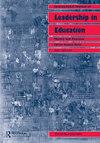Leadership experience and coping strategies of women secondary school principals: lesson from Ethiopia
IF 2.5
Q1 EDUCATION & EDUCATIONAL RESEARCH
International Journal of Leadership in Education
Pub Date : 2023-11-14
DOI:10.1080/13603124.2023.2267009
引用次数: 0
Abstract
ABSTRACTThis study explored women principals’ leadership experiences, challenges, and their coping strategies for maintaining their positions. A qualitative study was employed using a semi-structured in-depth interview. Addis Ababa City Administration was purposively selected due to a high turnover of women principals. Eleven secondary school principals were selected using availability sampling as they are the only women principals in the city administration. The findings of the study revealed that women principals’ assignments in various positions such as department head, unit leader, vice principal, and women primary school principals commitment motivated them to aspire to become secondary school principals, along with strong support from their colleagues and their desire to be a leader. The study revealed that teachers’ unwillingness to accept women principals, insufficient support and inappropriate interference from top-level managers were major challenges they faced when executing their roles and responsibility. Respect for staff, patience, delegating work, implementing appropriate measures, and seeking cooperation from parents and the education department was found to be their crucial coping strategies. Large-scale research is needed, and more women principals should be encouraged to take leadership roles responsibilities. Disclosure statementNo potential conflict of interest was reported by the author(s).Additional informationNotes on contributorsMesfin Manaze WoldegebrielMesfin Manaze Woldegebriel is a PhD candidate at the University of Tasmania. Mesfin previously worked at Jigjiga University in Ethiopia as an assistant professor of educational policy and leadership and researcher and served in various leadership roles. His research interests include educational policy and leadership, diversity management in higher education, and teacher education.Geberew Tulu MekonnenGeberew Tulu Mekonnen is a Research Funding Officer at the University of Tasmania. He completed his PhD at the same university and his area of study is higher education governance. Prior to joining the University of Tasmania, he worked both in administrative and academic posts at Addis Ababa University, Ethiopia. His areas of interest are teacher education and higher education policy, governance and leadership.女中学校长的领导经验与应对策略:来自埃塞俄比亚的经验
摘要本研究探讨女性校长的领导经验、挑战,以及维持职位的因应策略。质性研究采用半结构化深度访谈。之所以有意选择亚的斯亚贝巴市政府,是因为女性负责人的更替率很高。采用可得性抽样方法选择了11位中学校长,因为她们是该市政府中唯一的女校长。研究结果显示,女校长所担任的不同职位,如系主任、单位领导、副校长、女小学校长的承诺,以及同事的大力支持和她们成为领导的愿望,促使她们渴望成为中学校长。研究显示,教师不愿意接受女校长、支持不足及高层管理人员不当干预是他们在履行角色和责任时面临的主要挑战。尊重员工、耐心、委派工作、采取适当措施以及寻求家长和教育部门的合作是他们的关键应对策略。需要进行大规模的研究,并鼓励更多的女性校长承担领导角色和责任。披露声明作者未报告潜在的利益冲突。作者简介:mesfin Manaze Woldegebriel是塔斯马尼亚大学的博士研究生。Mesfin曾在埃塞俄比亚吉吉加大学担任教育政策与领导力助理教授和研究员,并担任过各种领导职务。主要研究方向为教育政策与领导、高等教育多元化管理、教师教育。Geberew Tulu Mekonnen是塔斯马尼亚大学的研究资助官员。他在同一所大学完成了博士学位,他的研究领域是高等教育治理。在加入塔斯马尼亚大学之前,他曾在埃塞俄比亚亚的斯亚贝巴大学担任行政和学术职位。他的研究领域是教师教育和高等教育政策、管理和领导。
本文章由计算机程序翻译,如有差异,请以英文原文为准。
求助全文
约1分钟内获得全文
求助全文
来源期刊

International Journal of Leadership in Education
EDUCATION & EDUCATIONAL RESEARCH-
CiteScore
5.10
自引率
14.30%
发文量
65
期刊介绍:
International Journal of Leadership in Education: Theory & Practice is an international journal for the publication of theoretical and practical discussions of educational leadership. The Journal presents: •cutting-edge writing on educational leadership, including instructional supervision, curriculum and teaching development, staff development, educational administration and more; •an alternative voice: reports of alternative theoretical perspectives, alternative methodologies, and alternative experiences of leadership; •a broad definition of leadership, including teachers-as-leaders, shared governance, site-based decision making, and community-school collaborations.
 求助内容:
求助内容: 应助结果提醒方式:
应助结果提醒方式:


